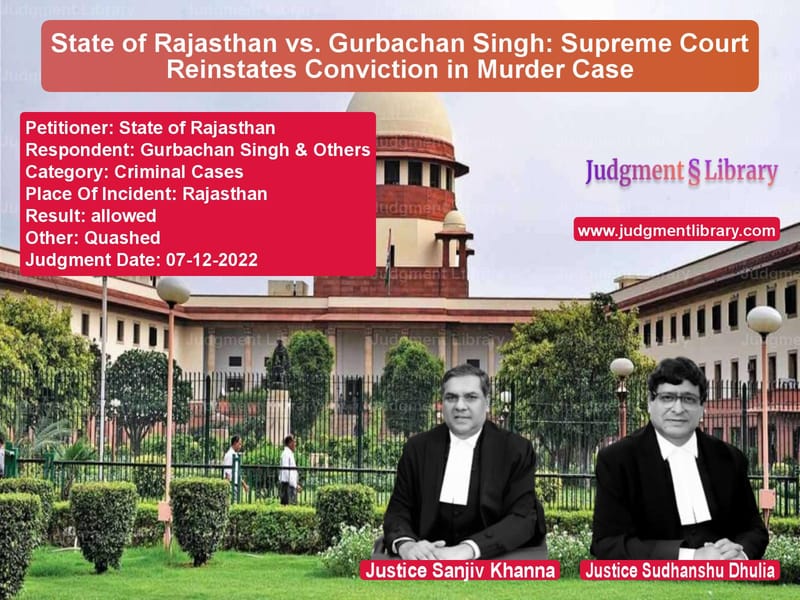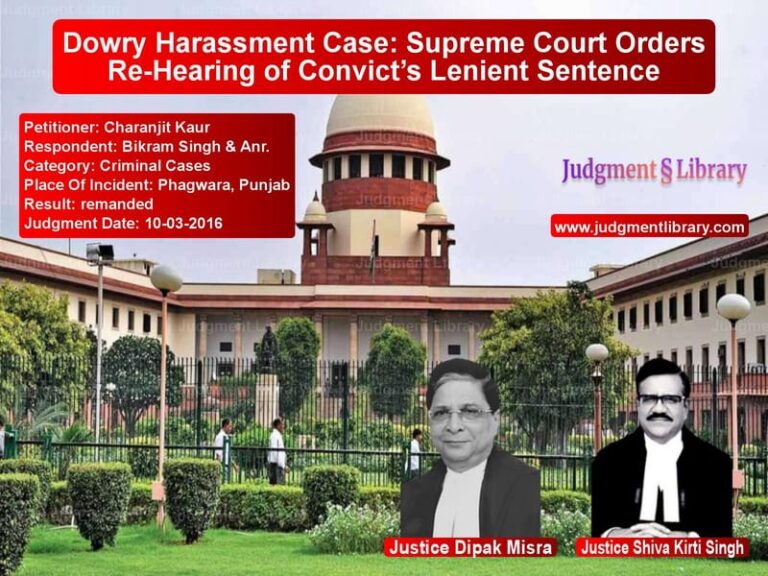State of Rajasthan vs. Gurbachan Singh: Supreme Court Reinstates Conviction in Murder Case
The Supreme Court of India, in its judgment dated December 7, 2022, in the case of State of Rajasthan vs. Gurbachan Singh & Others, reinstated the conviction of Gurbachan Singh in a murder case under Section 302 read with Section 34 of the Indian Penal Code (IPC). The Court overturned the Rajasthan High Court’s decision that had acquitted him under Section 302 IPC and convicted him only under Section 323 IPC. The Supreme Court held that Gurbachan Singh shared a common intention with the other accused to commit the murder of Teja Singh.
Background of the Case
The case originated from a land dispute in Rajasthan. On November 6, 2000, at around 7:30 PM, Teja Singh was brutally attacked and killed by Gurbachan Singh and his associates—Balvir Singh, Manjeet Singh, and Darshan Singh—using various weapons, including a ‘lathi,’ ‘toka,’ axe, and ‘gandasi.’ The prosecution’s case was that the attack was premeditated and stemmed from a prior dispute regarding the plowing of a plot of land belonging to the Water Works Department.
The trial court convicted Gurbachan Singh and the co-accused under Section 302 read with Section 149 IPC and sentenced them to life imprisonment. However, the Rajasthan High Court, in its judgment dated April 4, 2008, acquitted Gurbachan Singh of murder, ruling that he did not share a common intention with the other accused. Instead, the High Court convicted him only under Section 323 IPC, reasoning that his role was limited to inflicting injuries with a ‘lathi.’ The State of Rajasthan appealed against this decision in the Supreme Court.
Read also: https://judgmentlibrary.com/supreme-court-convicts-accused-in-rajasthan-land-dispute-murder-case/
Arguments Presented
Petitioners’ (State of Rajasthan) Arguments
The State of Rajasthan, represented by its counsel, argued:
- The High Court erred in acquitting Gurbachan Singh under Section 302 IPC despite strong evidence that he actively participated in the assault.
- All the accused arrived at the crime scene armed with weapons, which indicated prior planning and common intention.
- Gurbachan Singh initiated the attack by striking Teja Singh’s feet with a ‘lathi,’ causing him to fall. This action facilitated the brutal assault that led to Teja Singh’s death.
- The High Court misapplied the law on common intention under Section 34 IPC, failing to consider that even though Gurbachan Singh used a ‘lathi,’ he shared the intent with the others to cause fatal injuries.
Respondents’ (Gurbachan Singh) Arguments
The respondents, represented by their counsel, countered:
- Gurbachan Singh did not inflict any injuries on vital parts of Teja Singh’s body.
- He was only carrying a ‘lathi’ and did not use any sharp-edged weapons, unlike the co-accused.
- There was no direct evidence proving that he had a common intention to kill Teja Singh.
Supreme Court’s Observations
The Supreme Court analyzed the evidence and held:
- “Gurbachan Singh arrived at the scene armed with a ‘lathi’ along with the co-accused, who carried deadly weapons like a ‘toka,’ axe, and ‘gandasi.’ His presence and participation indicate a shared common intention.”
- “He struck the first blow on Teja Singh, making him fall, which enabled the co-accused to inflict fatal injuries. This act alone is sufficient to establish common intention.”
- “A common intention does not require that every accused must inflict fatal injuries. It is enough that they acted with a shared purpose.”
- “Gurbachan Singh’s conviction under Section 302 IPC, set aside by the High Court, is reinstated under Section 302 read with Section 34 IPC.”
Legal Interpretation of Common Intention Under Section 34 IPC
The Court clarified the principle of common intention under Section 34 IPC:
- For common intention to apply, there must be a prearranged plan and participation by all accused in furtherance of the criminal act.
- Even if an individual does not deliver the fatal blow, their participation in the attack can make them equally liable.
- The intent can be inferred from conduct, such as arriving at the scene armed and initiating the attack.
Judgment and Ruling
The Supreme Court ruled in favor of the State of Rajasthan with the following key directions:
- The Rajasthan High Court’s judgment acquitting Gurbachan Singh under Section 302 IPC was quashed.
- Gurbachan Singh was convicted under Section 302 read with Section 34 IPC and sentenced to life imprisonment.
- His conviction under Section 324 IPC for injuries inflicted on Harbhajan Singh (PW-1) was upheld.
- He was directed to surrender within 21 days to serve the remainder of his sentence.
Implications of the Judgment
This ruling has significant implications for criminal law and the doctrine of common intention:
- Reaffirmation of Common Intention Principle: The judgment underscores that all participants in a criminal act can be held equally liable, even if they play different roles.
- Strengthening Prosecution in Group Assault Cases: The decision aids prosecutors in proving intent in cases where multiple individuals are involved in violent crimes.
- Deterrence Against Group Crimes: The ruling ensures that individuals cannot evade murder charges by claiming their role was minor.
Conclusion
The Supreme Court’s ruling in State of Rajasthan vs. Gurbachan Singh & Others reinforces the doctrine of common intention in criminal law. By reinstating the conviction under Section 302 IPC, the Court has emphasized that when a group of individuals acts with a shared intent, all are equally responsible for the consequences. This landmark judgment serves as a critical precedent in cases involving group assaults and planned criminal acts.
Petitioner Name: State of Rajasthan.Respondent Name: Gurbachan Singh & Others.Judgment By: Justice Sanjiv Khanna, Justice Sudhanshu Dhulia.Place Of Incident: Rajasthan.Judgment Date: 07-12-2022.
Don’t miss out on the full details! Download the complete judgment in PDF format below and gain valuable insights instantly!
Download Judgment: state-of-rajasthan-vs-gurbachan-singh-&-ot-supreme-court-of-india-judgment-dated-07-12-2022.pdf
Directly Download Judgment: Directly download this Judgment
See all petitions in Murder Cases
See all petitions in Attempt to Murder Cases
See all petitions in Judgment by Sanjiv Khanna
See all petitions in Judgment by Sudhanshu Dhulia
See all petitions in allowed
See all petitions in Quashed
See all petitions in supreme court of India judgments December 2022
See all petitions in 2022 judgments
See all posts in Criminal Cases Category
See all allowed petitions in Criminal Cases Category
See all Dismissed petitions in Criminal Cases Category
See all partially allowed petitions in Criminal Cases Category







